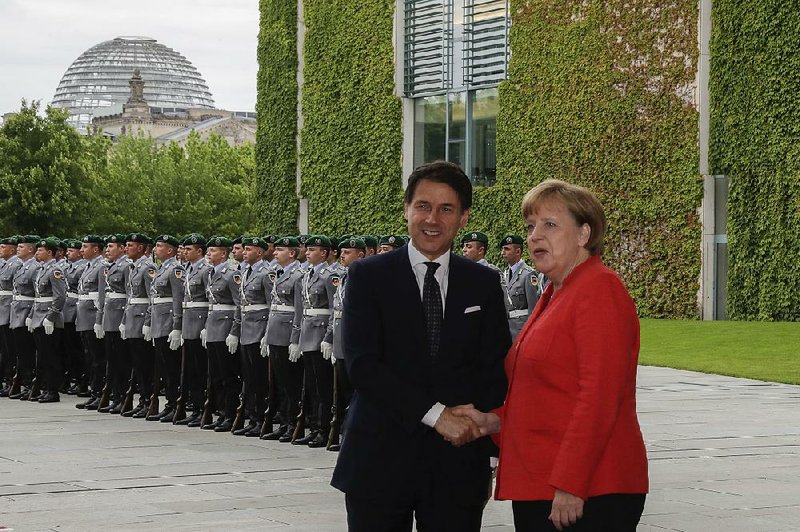BERLIN -- Angela Merkel and her interior minister agreed Monday to a two-week pause in their standoff over migration in Germany, leaving the chancellor to make a deal with European allies on an issue that threatens to topple her government.
The reprieve came after Merkel and Interior Minister Horst Seehofer huddled with top members of their conservative parties to discuss a possible resolution in response to Seehofer's pledge to reverse Merkel's open-door policy toward migrants. Seehofer leads the Bavarian conservative party, the Christian Social Union, the sister party to Merkel's Christian Democratic Union and a crucial coalition partner.
Addressing reporters in Berlin after her meeting, Merkel called the dispute "a very difficult situation" but insisted that "the CDU and the CSU have the common goal of improving regulation of migration in our country."
Just before the chancellor finished speaking, President Donald Trump weighed in on the German debate, writing on Twitter, "The people of Germany are turning against their leadership as migration is rocking the already tenuous Berlin coalition." He called it a "big mistake" for Europe to admit large numbers of migrants.
Trump stated wrongly that "crime in Germany is way up" as a result of the arrival of migrants, much as he has linked illegal immigration to crime in the United States. Crime in Germany is the lowest it has been in decades.
Although the number of newly arriving migrants continues to fall across Europe, Germany is still struggling to process the nearly 1.4 million people, many of them Muslims fleeing conflict in Syria, Afghanistan and Iraq, who arrived three years ago.
Appearing before reporters in the Bavarian capital, Munich, about 20 minutes after Merkel spoke, Seehofer sounded less conciliatory, saying that once he returned to Berlin, he would begin laying the groundwork to change German policy over the chancellor's objections. If Merkel fails to reach an agreement with Germany's European partners to limit migration, he said, he will be able to begin turning back new arrivals at the start of next month.
"We still do not have a grip on the whole migration issue," Seehofer said. While his party supports a European solution, he added, he wants to be ready to begin turning back any migrant whose asylum process is pending in another European Union country, or who has been registered as arriving there.
"This is not about buying time," Seehofer said of the agreement reached with the chancellor. "If there is no solution reached, in July we will have to begin" turning people away.
Merkel is to meet with her party's leadership July 1 to discuss the outcome of meetings with EU leaders to be held in Brussels on June 28 and 29.
Driven in part by the civil war in Syria, the number of asylum seekers entering Germany began to rise sharply in 2013, when it reached almost 110,000, and then soared after Merkel changed the policy in the summer of 2015.
The flow of migrants has slowed since 2016, but it remains higher than it was in the years before the Syrian war.
Taking a harder line, similar to that of Hungary and more recently Austria, Seehofer has pledged what the Bavarian conservatives are calling an "asylum reversal," which includes tightening the country's borders.
The chancellor and her Christian Democrats pledged in the agreement defining the terms of their government that 2015 would remain an exception that was not to be repeated.
"We are convinced that Germany needs a reversal in its asylum policy," said Markus Soder, a member of Seehofer's party and the governor of Bavaria. "Of course, it would be good if there is a European solution, but in three years that hasn't been reached."
As interior minister, Seehofer has drawn up a 63-point plan for tackling migration to Germany. It was supposed to be put before the Cabinet last week, but Merkel refused to approve the point about refusing people at the borders. Seehofer told reporters Monday that he had presented it, orally, to his party and to the chancellor.
Merkel has long insisted that migration is a Europe-wide problem that can be solved only through a Europe-wide agreement, and that adopting Seehofer's position would spell the end to freedom of movement throughout the EU, a cornerstone of membership in the bloc.
On Monday, the EU asylum office said the number of people applying for international protection in Europe has plunged but remains higher than before 2015.
The office said in an annual report that 728,470 application requests were made for international protection in 2017, compared with almost 1.3 million applications the previous year. It says around 30 percent of the applicants are from conflict-torn countries such as Syria, Afghanistan and Iraq.
Also, the International Red Cross said the number of people migrating through the Balkans is on the rise and that they are in dire need of basic humanitarian support.
The International Federation of Red Cross and Red Crescent Societies said Monday that more than 5,600 migrants entering Europe through Greece have reached Bosnia and Herzegovina so far this year, compared with 754 in all of 2017.
The Red Cross also said that in Montenegro, 557 asylum requests were registered in May, the highest monthly figure in five years.
Simon Missiri, regional director for Europe, said his group's Balkan offices need more assistance to help cope with the increased number of migrants.
Since peaking in 2015, the migrants' use of the Balkan route toward Western Europe has been impaired in part by Hungary's construction of razor-wire fences on its southern borders.
Information for this article was contributed by Melissa Eddy of The New York Times and by staff members of The Associated Press.
A Section on 06/19/2018
